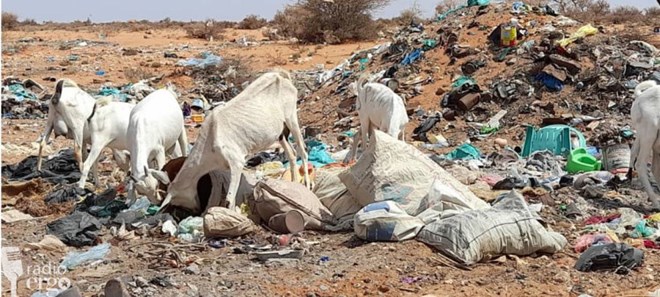
Thursday September 23, 2021

Pastoralists in Adado concerned over urban garbage dumped in their grazing fields/Osman Mohamed Ahmed/Ergo
Pastoralists on the outskirts of Adado in central Somalia say plastic waste from the town is being dumped on their grazing land and causing harm to their livestock.
Mohamed Abdullahi Dore told Radio Ergo that 21 of his goats died and others fell sick after feeding on piles of waste that included plastic, medical gloves and syringes. He decided to move away with his 69 remaining goats, 25 of which are sick, to Biyo-Gadud village, 20km away.
“We can’t be chasing after the goats all the time stopping them from eating garbage. If an animal eats garbage, it becomes useless. You can’t keep it for breeding and no one will buy it from you, and it dies in front of your eyes after sometime,” he said.
According to Mohamed, he kept his goats in a rural area eight kilometers south of Adado, where he had constructed a water storage tank for them. He had to leave that behind because trucks from the town were dumping rubbish there every morning.
“Plastic bags from the garbage are blown everywhere by the wind and stick in all the trees,” he said.
Pastoralists depend on selling their livestock to brokers for export to countries in the Middle East or for local meat consumption. Mohamed said his herd lost their value and he has been working as a porter in town for the past three months, earning around six dollars at most, to support his family of nine.
The trucks that dump waste on the grazing land also dig holes and remove stones for construction. The herders say the already diminished pasture is being further eroded.
Abdiqani Abdulkadir Mohamed, a pastoralist with 120 goats in Gal-dhuumood village, 15 km west of Adado, says he lost 20 goats between February and August. Thirty of his remaining 120 goats are sick. He blames the unregulated dumping of waste.
“The garbage is not just having bad health effects on the livestock, it is also affecting us locals. The contents of the garbage include used syringes with needles, face masks and medical gloves. The children pick it up and play with it, it could cause terrible problems,” he said.
Whilst Adado district administration has allocated a dump site on the northern outskirts of town, there are no garbage collection vehicles nor management of the waste being disposed.
Dr Mohamed Ahmed Nure, a veterinarian, told Radio Ergo that livestock must be fed well to stop them from eating waste. Mineral blocks might also be effective although they are not on sale in Somalia. The only way to remove plastic that is blocking an animal’s gut would be surgery.
A group of 20 youth volunteers are raising awareness among the public on the risks that waste poses for livestock and communities. Abdinur Isse Elmi, the group leader, said they have been visiting affected villages since April and are helping the pastoralists in collecting and burning the rubbish.